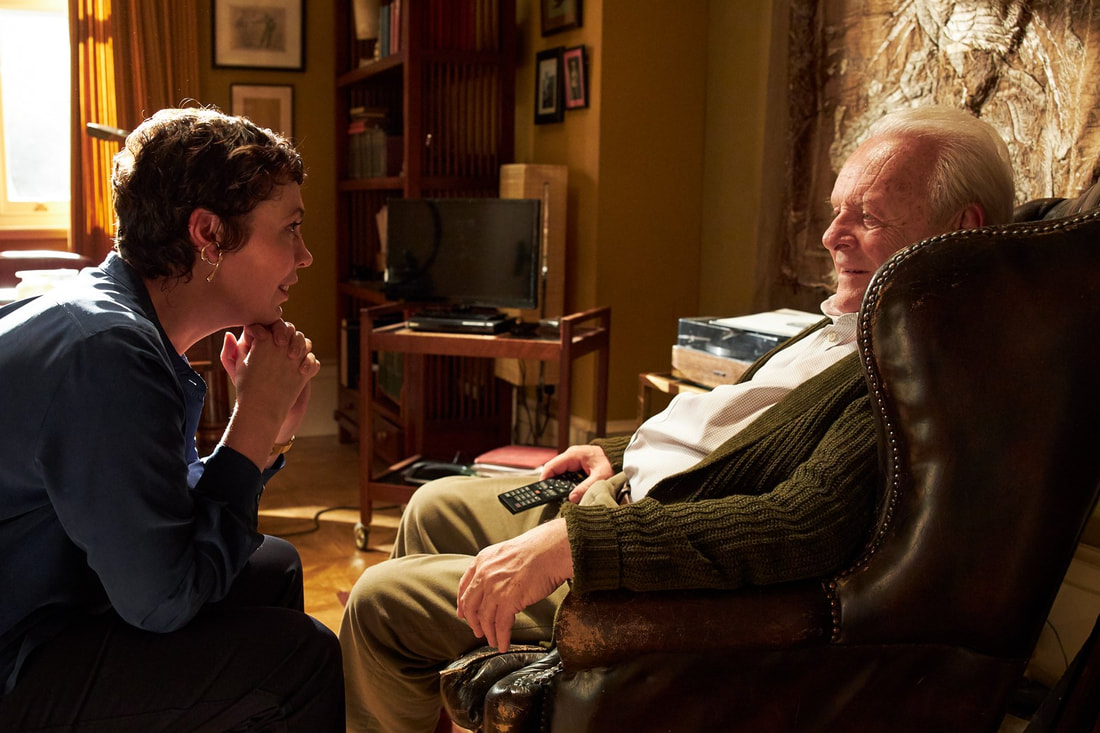|
Olivia Colman and Anthony Hopkins in The Father (2021) Perspective plays a compelling role in The Father, the debut feature by writer-director Florian Zeller. Adapted from Zeller’s 2012 stage play, this film tells a sensitive and terrifying story about Anthony (Anthony Hopkins), who refuses assistance from his daughter Anne (Olivia Colman) and numerous carers as the fabric of his mind rapidly changes. Suffering from dementia, Anthony tries to make sense of his circumstances and begins to doubt his loved ones in the process. Zeller’s direction holds a mirror reflection to Anthony’s loss of memory, communication, and thinking. The film evokes a strong feeling of disorientation, like being in one place and somewhere else at the same time. Rather than focusing on an outsider’s point of view, the effects of dementia are conveyed directly from Anthony’s perspective. How does this character feel about what’s happening to him? How does his illness change the way he looks at his family? How does he navigate other people’s perceptions of him? How does he react to the constant changes in space and time? Zeller tackles all of these questions and then some, which makes the experience of watching The Father feel so heartbreakingly real.
The story takes place primarily in one setting: a small North London flat that becomes another character in the film. Through the use of furniture, proportions, and lighting, Zeller is able to create a place that feels familiar and different at the same time. After a while of seeing the same knick knacks and corridors, there is a feeling that something has changed at some point without knowing exactly what. Peter Francis’ production design on this film is absolutely stellar, as is Cathy Featherstone’s set decoration. Over the course of the story, subtle differences are made to the positioning of objects and the location of rooms. The metamorphosis of Anthony’s flat is a striking example of how the film holds a mirror to his frame of mind from a technical standpoint. The editing by Yorgos Lamprinos is also completely in tune with Zeller’s vision. One of the reasons for The Father’s journey being so emotionally resonating is the structure, which strives for a truthful depiction of Anthony’s point of view in each and every moment. For example, when the film first introduces Anthony in his flat, there is no doubt that this place is his. The pacing of the film has a slow start but in retrospect, Zeller is laying out a truthfully inventive foundation for the maze of contradictions that follows. Situations arise and Anthony begins to question himself. He realizes just how far away he is from the fabric of his own reality. He realizes just how quickly time slips away. The film incorporates a resonating symbol into this story, a recurring moment between Anthony and his watch. Believing that his watch was stolen, every now and then he will recall that he needs to look for it. The watch is an interesting symbol of time disappearing…one can’t make more of it, nor can one control it. To watch Anthony's shock and confusion by the passing of time is devastating. In addition to the structure and technical details, the film brings together a remarkable group of actors (especially Hopkins and Colman) who create magic on screen. Florian Zeller initially wrote The Father with Anthony Hopkins in mind, hence the character’s name Anthony. To see Hopkins bring this character to life, with the screenplay by Zeller and co-writer Christopher Hampton as a springboard, is an astonishing experience. He completely embodies the role and gives the best performance of his career. Anthony’s fear, heartbreak, confusion, loneliness, and moments of vicious spite are a tough watch. This is a character crumbling in real-time, losing his bearings from one moment to the next. Hopkins commands the screen with an instinctive, profoundly moving performance that gets inside the headspace of a person living with dementia. Another example of pitch perfect casting is Olivia Colman as Anthony’s daughter. Anne is a character one can immediately empathize with; she’s in a tough spot of answering the question of what to do when someone you love is suffering from dementia. The responsibility falls on her to make decisions on her father’s behalf, and at the same time, she tries so desperately to make him understand the reality of what’s going on but she can’t get through to him. Colman has such an exquisite talent, and once again shows her ability to convey such complex emotions in the blink of an eye. Anne’s dedication, vulnerability, sadness, and pure love for her father are written across her face. So many of her interactions with Anthony are devastating to watch, particularly when a third character is involved and she’s trying to make peace with everyone. Committed performances by Olivia Williams, Imogen Poots, Mark Gatiss, and Rufus Sewell further perpetuate an atmosphere of paranoia. Their characters are also seen from Anthony’s perspective and thus take on a different meaning throughout the film. From the outside looking into this depiction of dementia, one can never truly know what it’s like to live with this illness. What makes Florian Zeller’s debut feature so compelling is his decision to tell the story from Anthony’s perspective, following so closely alongside his frame of mind throughout the film. Zeller introduces a strong narrative and presents reality as Anthony knows it, which shows the day-to-day effects that dementia has on this character. It’s a story told from the inside out, creating the experience of being inside Anthony’s head and feeling a part of something much bigger than him. The film shares universal topics of living with dementia, along with being a family member of someone who has this illness, in an up-close and personal kind of way. The Father is a phenomenal achievement, a stunning balance of drama and psychological horror that leads with big-hearted sensitivity.
0 Comments
Leave a Reply. |
Archives
June 2024
Categories |


 RSS Feed
RSS Feed